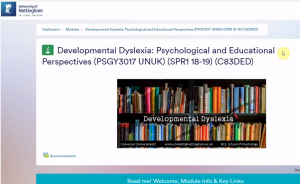
April 8, 2019, by Emma Birkett
Psychology Learning and Teaching Enhancement Group
Welcome to the new PLATE Blog! PLATE is the Psychology Learning and Teaching Enhancement Group within the School of Psychology at the University of Nottingham which brings together those interested in developing learning and teaching within the school. We meet monthly and discuss diverse areas of practice, help each other to create resources or learning strategies and disseminate information from CPD events. You might find this blog of interest if you have any role in teaching in higher education and we welcome feedback on our posts via the comments or via twitter. February’s PLATE meeting saw discussion of a paper on attitudes towards statistics in psychology and a demo of a tool for creating embedded videos of software walkthroughs.
Attitudes towards Statistics in Psychology
We discussed a thought-provoking pilot study conducted by Professor Victoria Bourne and Rachel Nesbit (Royal Holloway, University of London) on attitudes towards statistics. This paper highlights the challenges of teaching statistics to psychology students, many of whom may only have studied maths to GCSE level. The study used the Statistics Anxiety Rating Scale (STARS) to measure anxiety about and attitudes towards statistics in 41 A-level psychology students. The authors examined which of the STARS subscales best predicted the choice of whether to study psychology at University after controlling for Maths GCSE grade and school type (state/grammar/private). Only the “worth of statistics” attitudinal subscale was a significant predictor of the choice to continue studying psychology once maths GCSE grade and school type had been controlled for. Also, compared to students in state schools, significantly fewer students from private schools intended to study psychology, and maths GCSE grade was not a significant predictor of intention to study psychology.
If replicated, these findings are important because they suggest that students who value core elements of psychological research methods are those who are more likely to apply to study the subject. Institutions may be able to capitalize on this in admission programmes for students from STEM backgrounds or in our teaching, by helping students of all ability levels to recognize the importance of statistics either at A-Level or in their early undergraduate years. The findings were present even when any differences in maths attainment or schooling were controlled for, suggesting that this “worth” perception is a culmination of something more than experience with maths or environmental influences that might affect maths perception. Whilst this study focused at pre-HE level, it would be useful to know whether these differences have any predictive utility in accounting for degree performance.
Although Bourne and Nesbit did not measure awareness of psychology degree course content in their survey, they point to previous research suggesting that students are not aware that statistics might be a substantial part of their course. In our experience, however, many prospective students are somewhat aware of stats being part of the degree programme as they frequently ask about this when we meet them at open days and statistical methods are included in major A-Level syllabi. Whether students are aware of how statistics are used in psychology may influence understanding of the worth of statistics or anxiety towards statistics and it may be useful to operationalise and control for this in future studies of this kind.
Although Bourne and Nesbit reflect widely on the influence of both anxiety and worth in the discussion section we wanted to know more about what the worth measure was capturing since worth, not anxiety, was the key predictor related to intention to study psychology. It may be that worth-of-statistics is a dimension which explains anxiety in some way. When we examined the worth-of-statistics sub-scale further, we found it comprised the greatest number of items of any of the STARS subscales, which could have led to a greater range of scores compared to the other scales. The “worth” items themselves also appear to be negatively biased, asking students to rate mostly negative attitudes towards statistics, rather than an equal mix of positive and negative statements.
In the same issue of the Psychology Teaching Review, Nesbit and Bourne actually provide a review and critique of the STARS measure. They suggest that some minor changes to the structure of the questionnaire may result in more consistent factors centered on the factors claimed to be measured by the sub-scales. The pilot study results therefore need to be considered in the context of the current limitations to the STARS and future studies may benefit from further consideration of the validity of the scales.
In the second half of our PLATE meeting, Alex Bradley introduced us to FlashBack express, which he had used to create some learning resources for his toolbox on web scraping. FlashBack express allows you to easily create screen-casts which could be used for software demos. In psychology, this kind of resource could be particularly useful for demonstrating the use of statistical or experimental software packages, but could also be used to demo literature searching or guided reading tasks. The free version of the tool provided sufficient functionality for Alex’s needs and allowed importing into YouTube which in turn provides a simple video editing toolbox.
Just to check how easy the tool is to use I created this little walkthrough of my Moodle module page for the final year module I convene on Developmental Dyslexia. From download of FlashBack express through to saving the recording file took exactly 10 minutes – it’s pretty self-explanatory! The only tip I have so far is to not move the mouse too quickly/too much!
Watch out for our next installment of the PLATE Blog in the next 2 weeks, where we’ll be discussing embedding careers in the undergraduate psychology curriculum. Please contact us via @NottsPsych on twitter or through the comments below.
Written by: Dr Emma Birkett, Teaching Associate, School of Psychology, @emskibirkett
No comments yet, fill out a comment to be the first


Leave a Reply